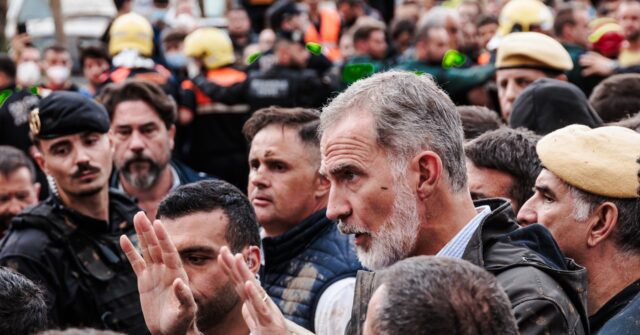On a recent visit to the flood-stricken region of Paiporta, Spain, King Felipe VI, Prime Minister Pedro Sánchez, and other governmental officials faced a hostile reception from local residents who were grappling with the aftermath of one of the country’s deadliest natural disasters. The visit took place shortly after devastating floods claimed the lives of over 200 individuals and caused widespread destruction to homes and infrastructure. The King and officials were met with a barrage of mud thrown by enraged survivors, expressing their frustrations over the government’s perceived negligence in effectively managing the crisis.
During the visit, as the leaders ventured into the affected area, they were confronted by a crowd exclaiming, “Get out! Get out!” and brandishing shovels and poles. The situation escalated to a point where law enforcement had to intervene, utilizing mounted police to manage the protestors. Despite the challenging circumstances, King Felipe VI exhibited composure amidst the jeers, making attempts to communicate with distressed residents. Unfortunately, the scene was marked by palpable emotions, with some citizens weeping and others openly questioning the government’s commitment to aiding those impacted by the floods.
The public outrage was heightened by the delayed response from authorities during the crisis. Reports indicate that alarm systems for severe weather alerts malfunctioned, notifying the public too late to take necessary precautions. Adding to the frustration, the cleanup efforts in the wake of the flooding have largely relied on the self-initiative of residents and volunteers, with many feeling abandoned by their leaders. Investigations into the government’s handling of the crisis have ignited debates about accountability and preparedness in the face of such disasters.
As the King conversed with individuals affected by the floods, he shown empathy, engaging with residents who articulated their desperate needs for essentials like food and clean water. The images of the King’s stained clothing, a result of the mud being thrown, contrasted with the royal family’s carefully curated public image. While some of the officials, including Queen Letizia and Valencia’s regional president Carlo Mazón, tried to connect with the locals, sentiments of discontent overshadowed any gesture of goodwill. People voiced their grievances loudly, emphasizing the need for immediate assistance and expressing a feeling of abandonment by their leaders.
Efforts to respond to the crisis have been beleaguered by logistical challenges. Five days post-flooding, many in Paiporta still lack access to drinking water, with heaps of debris littering the streets and rendering neighborhoods uninhabitable. Amidst the devastation, calls for accountability have been directed at local and national leaders, particularly targeting Sánchez and Mazón. Survivors have openly questioned where the government aid has been while they struggled to clean their homes, salvage their belongings, and recover from the psychological toll of the disaster.
After roughly thirty minutes of confrontation and attempts at dialogue, the royal entourage departed under police escort amid continued protests and expressions of anger. The visit served as a stark reminder of the profound disconnect between affected citizens and their leaders during times of crisis. This event may provoke shifts in public perception regarding the government’s ability to manage natural disasters, potentially influencing future policies aimed at disaster preparedness and response. The tragedy faced by the residents of Paiporta presents an opportunity for reflection and reform in how such emergencies are handled to mitigate suffering and restore trust in political institutions.

